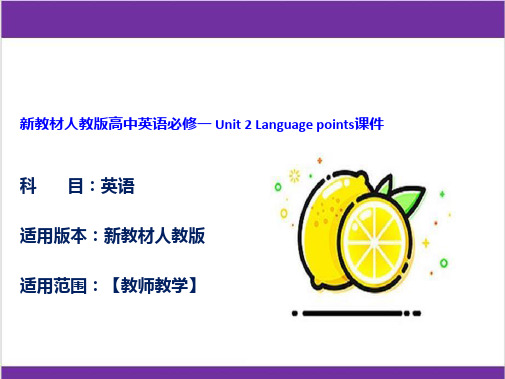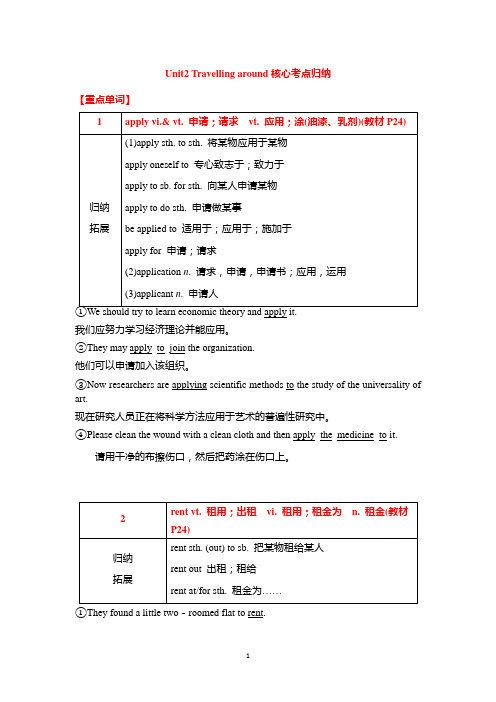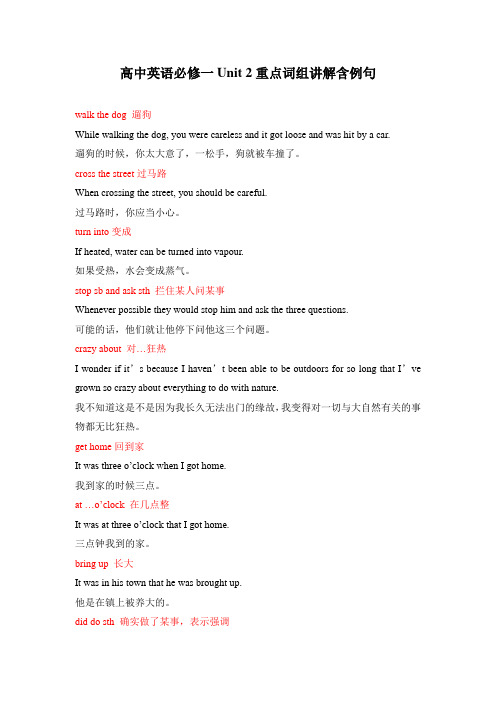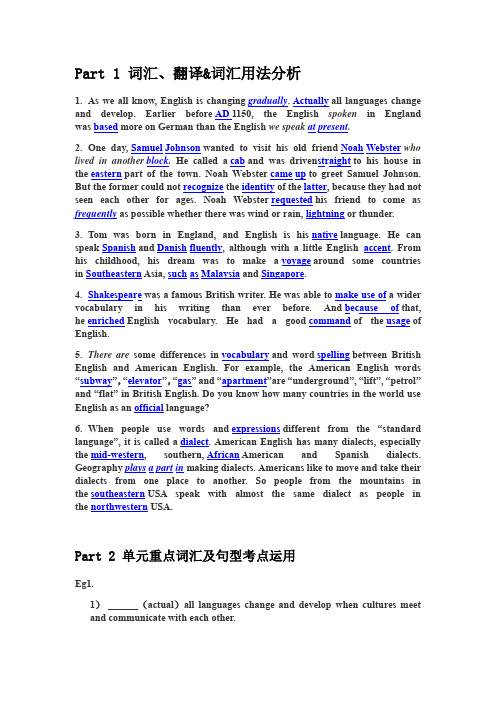人教版高中英语必修一unit2语言点
人教版高中英语必修一Unit-2单元知识点

人教版高中英语必修一U n i t-2单元知识点(总10页)--本页仅作为文档封面,使用时请直接删除即可----内页可以根据需求调整合适字体及大小--必修一 Unit2 English around the world要点提炼 Section A重点词汇,短语,句式adj.官方的;正式的;公务的You will have to get official permission to cut down the trees.你得获得官方批准才可以砍伐这些树。
There will be an official inquiry into the matter.将对这件事进行正式调查。
【拓展】official 或 officer两者都有官员的意思,但是所指不同1,official常指政府官员或行政官员2,officer常指身特定制服的官员,如军官或者警官等。
练习:我爸爸是军官,而他爸爸是政府官员。
My father is an________ in the army, while his father is an________ in the government.答案:officer official3. native adj. 本国的;本土的 n.本地人,本国人The women are native people.这些妇女是本地人。
Finally, she returned to her native land.她最后返回了她的祖国。
The panda is a native of China.熊猫原产于中国。
【注意】native 做形容词用时,只能做前置定语。
be native to 意为(动植物)是…特有的,原产于…The tiger is native to India, 这种虎产于印度。
4. actually adv. 实际上;事实上(相当于in fact/as a matter of fact)He looked calm, but actually he was very nervous.他看起来很镇定,实际上却非常紧张。
人教版高中英语选择性必修一 Unit 2 单元重点回顾

prediction n.预言;预测;预报;预告 make a prediction for 对……做出预言/预测 9.forecast vt.& n.预测;预报
4.preference n.爱好;偏爱 have a preference for
偏爱
prefer vt.更喜欢
prefer sth to sth与某物相比更喜欢某物
prefer to do/doing sth更喜欢做某事
prefer doing sth to doing sth宁愿做某事而不愿做某事
switches on and off...
3.However,I could not help but
feel anxious.
4. Better not hang out with Sam then.
5.Nevertheless,I will always look on the positive side of change and
absent adj.缺席的;不在的;心不在焉的be absent from 缺席
-7-
单元重点回顾
主题语境 重点词汇 重点句型 重点语法
13.advocate vt.提倡;支持;拥护 n.提倡者;支持者;拥护者
advocate sth/doing sth主张(做)某事
advocate that...(should)do sth主张/提倡……做某事
in a
新教材人教版高中英语必修一 Unit 2 Language points课件

make up with sb. 与某人和解
第十九页,共二十七页。
【语境应用】翻译句子。
我们编了一个故事。这个故事由三个部分组成。其 中之一是关于一个人如何弥补他的过失的。
We make up a story. The story is made up of three parts, one of which is about how a man makes
2. Recognise text type recognise vt. to know who someone is or what
something is, because you have seen, heard, experienced, or learned about them in the past 辨别出;承认;认可
第十一页,共二十七页。
【归纳】 admire sb. for sth. 因某事而钦佩某人
【拓展】 admiration n. 赞美; 钦佩 express/ have admiration for sb./ sth. (表示) 羡慕/ 钦佩某人/ 物 with/ in admiration 钦佩地
第三页,共二十七页。
【语境应用】根据汉语意义完成句子。
1) 她是个优秀的教师,能够管好课堂纪律。
She's a good teacher who ___h_a_s_c_o_n_t_r_o_l_ofher class.
2) “你需要帮忙吗?”“不用,已经搞定了,谢谢。”
‘Do you need any help?’
up his mistakes.
第二十页,共二十七页。
高中英语新版人教必修一Unit 2 Travelling around知识点(单词短语语法句型)归纳

Unit2 Travelling around核心考点归纳【重点单词】We should try to learn economic theory and apply it.我们应努力学习经济理论并能应用。
②They may apply_to_join the organization.他们可以申请加入该组织。
③Now researchers are applying scientific methods to the study of the universality of art.现在研究人员正在将科学方法应用于艺术的普遍性研究中。
④Please clean the wound with a clean cloth and then apply_the_medicine_to it.请用干净的布擦伤口,然后把药涂在伤口上。
①They found a little two-roomed flat to rent.他们找到了一个出租的小两居室。
②The apartment rents_for $500 a month.这套房间每月租金为500美元。
③They actually moved down from upstairs because the rent was that expensive. 他们确实从楼上搬到了楼下,因为房租太贵了。
④We rented the villa to an American couple.我们将别墅出租给了一对美国夫妇。
I haven't packed my suitcase yet.我的行李箱还没收拾好呢。
②After dinner the customer packed_up the remains on the table.饭后,顾客把桌子上的剩饭打包了。
③He used to smoke a_pack_of cigarettes a day.过去他常常一天抽一包烟。
人教版高中英语必修一 UNIT 2TRAVELLING AROUND TRAVELLING

Ⅰ.核心单词 (A)写作词汇—写词形 1. rent vt.租用;出租vi.租用;租金为 n.租金 2. pack vi.& vt.收拾(行李)vt.包装n.(商品的)纸包;纸袋;大包 3. flat adj.平坦的;扁平的n.公寓;单元房 4. site n.地点;位置;现场 5. official adj.官方的;正式的;公务的n.官员;要员 6. type n.类型;种类vi.& vt.打字 7. flight n.空中航行;航班;航程 8. unique adj.唯一的;独特的;特有的 9. path n.小路;路线;道路
UNIT 2 TRAVELLING AROUND Ⅴ.必备语法 1.Over the October holiday, my parents and I are planning (plan) to go to Xi'an to see the Terracotta Army. 2.We are taking (take) the train, leaving the day before the October holiday begins. 3.We are arriving (arrive)at 9:30 a.m. and will start sightseeing right away...
It's amazing that there are more than 8,000 statues, and no one in modern times knew about them until the 1970s. 7.每尊雕塑面部都不同,使得研究人员相信每尊雕塑都是一个真正的士兵的复制 品。 Each statue has a different face, leading researchers to believe that each one is a copy of a real soldier.
人教版高中英语必修一Unit2 重点词组讲解含例句

高中英语必修一Unit 2重点词组讲解含例句walk the dog 遛狗While walking the dog, you were careless and it got loose and was hit by a car.遛狗的时候,你太大意了,一松手,狗就被车撞了。
cross the street过马路When crossing the street, you should be careful.过马路时,你应当小心。
turn into变成If heated, water can be turned into vapour.如果受热,水会变成蒸气。
stop sb and ask sth 拦住某人问某事Whenever possible they would stop him and ask the three questions.可能的话,他们就让他停下问他这三个问题。
crazy about 对…狂热I wonder if it’s because I haven’t been able to be outdoors for so long that I’ve grown so crazy about everything to do with nature.我不知道这是不是因为我长久无法出门的缘故,我变得对一切与大自然有关的事物都无比狂热。
get home回到家It was three o’clock when I got home.我到家的时候三点。
at …o’clock在几点整It was at three o’clock that I got home.三点钟我到的家。
bring up 长大It was in his town that he was brought up.他是在镇上被养大的。
did do sth 确实做了某事,表示强调He did go to the airport yesterday, but he didn’t find you.他昨天确实去了机场,但他没有找到你。
人教版高中英语必修一unit2重点词汇短语句型

BOOK1 Unit2
4. At the end of….. 在….的末尾 in the end=finally
5. Nearly 差不多,几乎 6. Even if 即使 7. Communicate with sb 与某人交流 8. At first 首先 9. Be based on 以….为基础 10. At present 现在 11. Make use of 利用
make full use of make the most of 充分利用
BOOK1 Unit2
12. The latter 后者 the former 前者 later in the 18th century 18世纪晚些时候 late 迟到的 latest 最新的
13. A number of 许多的,大量的 the number of …..的数量
16. Standard 标准,标准的 17. Expect sb to do sth 期待 18. On TV 在电视上 19. Play a part in 起….作用 20. The USA is a large country in which many different dialects are spoken.
定语从句 21. A lot of 很多的 (相当于形容词)
a lot 很多地(相当于副词) I have a lot of books. I like you a lot.
BOOK1 Unit2
22. You can make some jokes using these words. 分词作状语,You 和use 之间是主动关系,所以用ing
人教版高中英语必修一 unit 2 单元重点词汇及句型

Part 1 词汇、翻译&词汇用法分析Part 2 单元重点词汇及句型考点运用Eg1.1)(actual)all languages change and develop when cultures meet and communicate with each other.2)Growing vegetables looks easy, but (actual)it takes a lot of learning.Key: 1)actually 2)actuallyActually, adv.实际上,事实上,相当于in actual fact,as a matter of fact, infact,in reality等,actual为其形容词,做题注意分析句子中所需词性。
Exercise 1.There is a big difference between what they have said and what they have (actual)done.Exercise 2.He looks younger than his wife, but in (actually)fact, he is a lot older.Exercise 3. (actual),reading skills should be based on the knowledge of English writing.Eg2.1)It was (base) on German than the English we speak atpresent.2)They settled down at the base the mountain.3)Do you know where the air is?Key: 1) based 2) of 3)basebase v. 以...为根据base...on/upon,被动形式为be basedon/uponn. 基地,基础at the base ofExercise 1.We have all kinds of summer camp for your holidays. Youcan choose one (base)on your own interests.Exercise 2. (base)on a true story, the film attracts manypeople, whether they are old or young.Exercise 3. (base)an important decision more on emotion thanon reason, you will regret it sooner or later.Eg3.说出下面句子中present的意思分别为什么1)The present president present at the meeting presented us withpresents.present:adj:现在的&出席的 at present;到场的v.:颁发;把...交给... ; present sb. with sth. 呈现n.: 礼物 present sth. to sb.根据present的用法完成下列句子Exercise 1.I’m getting along well with my classmates .Exercise 2.The headmaster a medal each winner.Eg4.1)Every minute should be (make)of to study.Key: 1) madefull/good充分利用:make+ the best use ofthe mostExercise 1.You’d better (利用空闲时间)to gooutdoors.Exercise 2.Every possible use should be made advancedtechnologies.Eg5.1)He presented two solutions. The (后者) seemed muchbetter.2)The former question is more difficult for me than the one. Key: 1)latter 2)latterlatter n.(两者中的)后者(与the连用)adj.(两者中)后者的固定结构:the former...the latter... 前者...后者...Exercise 1.I have two friends, Mary and Lily. (前者)is good at dancing, (后者)can speak Danishfluently.Exercise 2.If I were forced to choose one of the two, I would prefer Latter.Eg6.1)The old man is concerned about many teenagers, (例如)John, Peter and Tom.2)Tom doesn’t like sports. (例如),he is never seen toplay on the playground.Key:1)such as 2)For examplesuch as 用于列举前面提到的事物的一部分for example 用于举例说明,可以置于句首、句中或句末Exercise 1.Young people are encouraged to take part in team sports Football and basketball.Exercise 2.What would you do if you met a wild animal, a tiger,?Eg7.1)I (frequent)join in class discussions and talk withmy partner about problems of teenagers.2)More and more Chinese people can speak (fluently)English.Key:1)frequently 2)frequentfrequently adv.经常,频繁地其adj.为frequentExercise 1.Tom has studied English in London for many years and nowshe can speak English (frequent).Exercise 2.He made (fluently)visit to his grandparents.Eg8.1)Computers play important part in modern society.2)The actress was invited to play role in this TV playbased on a true story.Key:1)an 2)aplay a part/role in 在...中起作用;在...中扮演角色Exercise 1.Petrol (在...中起重要作用)our daily life.Exercise 2.He played important part in the TV SERIES.Eg9.1)The moment I answered the phone, I (recognize)hisvoice.2)It is (recognize)that the environment pollution hasbecome more and more serious.Key:1)recognized 2)recognizedrecognize vt.辨别出;辨认出;承认;公认 be recognized as... 被认为是...It is recognized that...人们公认...recognition n. beyond/out of recognition(变得)完全认不出来Exercise 1.Twenty years has gone and my hometown has changed beyond (recognize).Exercise 2.Believe it or not, Lily came up to me yesterday, but Ididn’t (认出)her at first.Eg10.1)When people use words and (express)different fromthe “standard language”, it is called a dialect.2)Young children often have difficulty (express)themselves.Key: 1)expressions 2)expressingexpression n.词语;表达;表情facial expressionexpress v.表达;快递 have difficulty (in) doingexpressive adj.有表现力的Exercise 1.In order to lear n English well, you’d better use important (express) frequently in everydaylife.Exercise 2.You should give (express)to your feelings in your speech.Exercise 3.The ability (express)an idea is important asthe idea itself.Exercise 4.A worried (express) crossed her face.Eg11.1)The manager requested that all the dusty curtains(be)washed.2)The general gave a command that they (start) at once.Key: 1)(should) be 2)(should) startcommand作“命令”讲,request作“请求,要求”讲时,that从句要用虚拟语气,即动词用“(should)+动词原形”,should可以省略。
- 1、下载文档前请自行甄别文档内容的完整性,平台不提供额外的编辑、内容补充、找答案等附加服务。
- 2、"仅部分预览"的文档,不可在线预览部分如存在完整性等问题,可反馈申请退款(可完整预览的文档不适用该条件!)。
- 3、如文档侵犯您的权益,请联系客服反馈,我们会尽快为您处理(人工客服工作时间:9:00-18:30)。
高中英语学习材料(灿若寒星*制作整理)Unit2 English around the world编稿:陈玉莲审稿:目标认知重点词汇base, command, request, develop, identity, expect, recognize, straight actually,重点短语because of, come up, make use of, play a part in, the number of, even if, in the way, more than重点句型1 Believe it or not, no such thing...... do you think...?知识讲解because of【原句回放】... and because of that, English began to be spoken in many other countries.【点拨】because of 因为,复合介词,后接名词、代词或宾语从句,在句中作状语。
because 是连词,引导原因状语从句;而because of是复合介词,后跟名词、代词、动名词或名词性从句。
【拓展】because of的同义短语:thanks to多亏,由于,作表语或状语owing to 由于,作表语或状语as a result of… 因为……的结果,作状语due to由于,一般不用于句首,作表语或状语on account of 由于,作状语come up【原句回放】I’d like to come up to your apartment. 我很乐意到你的公寓去。
【点拨】come up (人)走近;(太阳、月亮)上来,上升;被提出,被讨论;(意想不到地)产生,开始;发芽,长出The question never came up. 从不曾发生过这个问题。
The sun came up. 太阳升起了。
I’ll tell you if anything comes up. 如果发生什么事情,我会告诉你的。
He came up and asked me if I knew the time. 他走到我跟前来问我几点了。
Some flowers are just beginning to come up. 花正要长出来。
注意:作“提出”讲时,come up为不及物动词词组,无被动语态;如果要表达“提出……来”,应用come up with…。
【拓展】由come构成的常见短语:come up with想出(计划、回答);作出反应);产生come about 发生come to 总计;达到come up to 达到come out 出来,(书,唱片等)出版,发行come on 赶快,得了吧come up against 遇到(困难);遭到(反对);与……矛盾They came up against a number of unexpected problems. 他们遇到了意想不到的难题。
come up to 达到;数到;不负(期望);合乎(标准等)Your work doesn’t come up to what I expect of you.你的工作并没有达到我对你的要求。
come up with 提出(建议);[口语]找到(答案, 解决办法)The teacher asked a difficult question, but finally Tom came up with a good answer.老师出了一道难题,但最终汤姆给出了一个很好的答案。
actually【原句回放】Actually all languages change and develop when cultures meet and communicate with each other. 事实上,当不同文化互相交流渗透时,所有的言语都会有所变化、有所发展的。
【点拨】actually用作副词,意为“实际上,事实上”,相当于in fact:He looks in high spirit, but actually he was depressed.他看起来情绪高昂,但实际上却非常沮丧。
actually 竟然,居然He made that decision actually by drawing lots. 他居然用抽签的方法做出那项决定。
actually还可用于会话,用在不同意或者不满意的情况下,有时不表示具体含义。
base【原句回放】English was based more on German than the Eh we speak at present. 当时的英语更多地以德语为基础,而我们今天说的不是。
【点拨】base vt. (to find a basis for; establish) 根据,基于n.(the lowest or bottom part) 基部;(a foundation) 基础;基地base A on/upon B把A 建立在B的基础上A be based onB A以B为基础be based in 驻扎,设立;以……为基地base oneself on the interests of the people 从人民的利益出发He based his hope on the good news we had yesterday.他把希望寄托在我们昨天得到的好消息上。
This novel is based on fact. 这部小说是以事实为根据的。
make use of【原句回放】So by the 1600’s Shakespeare was able to make use of a wider vocabulary than ever before. 所以到了17世纪,莎士比亚所用的词汇量比之前任何时候都大。
【点拨】make use of 利用;使用use前可以加上各种形容词修饰:make the best (use) of 充分利用(时间等)make good use of 好好利用make full use of 充分利用make better/best use of 更好/最好地利用be of no use (to sb ) 对……没用【拓展】make the most of充分利用It’s no use doing sth 做某事没用It’s no use complaining. 发牢骚没什么用。
command【原句回放】Can you find the following command and request for Reading? 你能从阅读部分找出下列命令和请求吗?【点拨】command n. & vt. (to order, require) 命令,指挥;(to have knowledge or use of) 把握,掌握be at/by sb’s command 听某人支配;奉某人之命under one’s command/under the command of sb 由……指挥have a good command of 精通,掌握……command sb to do sth 命令某人干某事(be) in command of 指挥;掌握;控制command that… (should) do… 指挥……;命令……【拓展】短语have a good command of(精通)中,要注意不定冠词的使用。
command作动词或名词都可以跟从句,后接that从句时,从句中要用虚拟语气,谓语动词用“should +动词原形”,should 可以省略。
request【原句回放】Can you find the following command and request for Reading? 你能从阅读部分找出下列命令和请求吗?【点拨】request n.& vt.(the act or requesting/to express a desire for; ask for or demand)请求,要求She made a request for some water.她请求给点水。
I requested him to help me.我请求他帮助我。
at one’s request =at the request of sb 应某人的请求by request (of) 由于受到……的要求be in (great) request (大量)需要,受欢迎request sb (not) to do sth 要求某人做/不做某事request sth from/of sb 向某人要求某物request that… (should) do… 请求某人做…… (宾语从句用虚拟语气)It is requested that… 据要求……【拓展】request后接that从句“It is requested that +从句”时,从句中要用虚拟语气,谓语动词用“should +动词原形”,should 可以省略。
有类似用法的词还有:坚持(insist);命令(command, order);建议(advise, suggest, proposal);要求(request, require, demand, desire)ask, beg与request的区别:若要某人做某事,ask是最通俗、口语化的词。
I asked her to shut the window.我让她关上窗户。
request主要用于较正式的讲话和文字中,常用于通告中,多用于被动语态。
Passengers are kindly requested not to smoke in the car. 乘客请勿在车厢内吸烟。
beg指以谦恭的姿态要求给予帮助。
He knew he had hurt her and begged her to forgive him. 他自知伤了她的心而央求她原谅。
【高清课堂:unit2词语精讲】,develop【原句回放】Will Chinese English develop its own identity? 中式英语会发展出自己的特色吗?【点拨】develop最基本的含义为“发展,成长”。
Pneumonia(肺炎) can develop very quickly. 肺炎会迅速发展。
(develop为不及物动词)The course is designed to help students develop their speaking skills.这门课程是为帮助学生发展说话技能而设计的。
